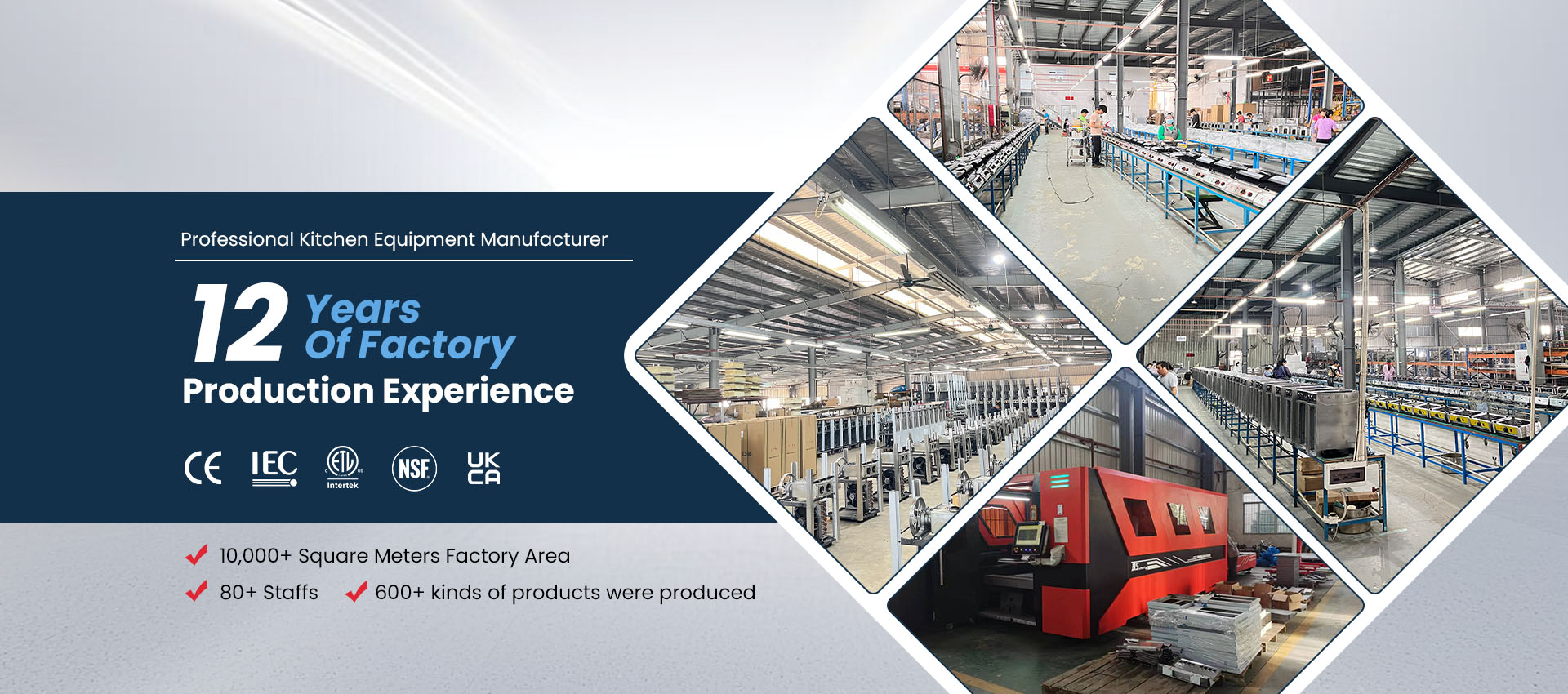How To Fry Fish In Gas Fish Fryer
Frying fish in a gas fish fryer is one of the most efficient and flavorful ways to prepare seafood for restaurants, hotels, and catering services. Gas Fryers heat up quickly, maintain consistent oil temperatures, and produce crispy, golden results when used correctly.
In this guide, we’ll explain how to fry fish in a gas fish fryer step by step, including temperature settings, preparation tips, safety precautions, and how MLP Kitchen Equipment designs its commercial gas fryers to ensure perfect results with every batch.
1. Why Use a Gas Fish Fryer
A gas fish fryer uses direct flame burners that heat oil faster and recover temperature more quickly after adding food. This is essential when frying fish, which requires precise heat to stay crispy outside and tender inside.
Advantages of Gas Fryers for Fish:
Fast heating: Reaches frying temperature within minutes.
Stable temperature control: Prevents oil from cooling down after each batch.
Energy efficiency: Gas consumption is lower than electricity for large-volume frying.
Consistent texture: Ensures even golden color and crisp coating on every piece.
Easy cleaning: Stainless-steel fry pots resist corrosion from seafood oil residues.
2. Tools and Ingredients You’ll Need
| Item | Purpose |
|---|---|
| Fresh fish fillets or pieces | Main ingredient |
| Oil (vegetable, soybean, or peanut) | Frying medium |
| Fish batter or breading | Creates crispy coating |
| Tongs or fryer basket | For safe lowering and lifting |
| Thermometer (if no built-in control) | Monitor oil temperature |
| Paper towels or drying rack | Drains excess oil |
| Seasoning | Enhances flavor after frying |
3. Step-by-Step: How To Fry Fish in a Gas Fish Fryer
Step 1: Prepare the Fish
Pat fish pieces dry with paper towels to remove moisture.
Season lightly with salt, pepper, or preferred spices.
Dredge in flour, batter, or breadcrumbs depending on your recipe.
Shake off excess coating to avoid clumping in the oil.
Moisture and excess batter can cause splattering, so make sure the fish is well coated but not dripping.
Step 2: Fill and Heat the Oil
Pour oil into the fryer up to the manufacturer’s recommended level.
Turn on the gas supply and ignite the burners.
Set the temperature between 170°C and 180°C (340°F–355°F) — ideal for most fish types.
Allow the oil to preheat fully before adding food. Uneven heating can lead to soggy or oily fish.
Step 3: Test the Oil Temperature
If your fryer doesn’t have a digital thermostat, use a cooking thermometer to check temperature.
You can also test by dropping a small piece of batter into the oil — it should rise and sizzle immediately without burning too quickly.
Step 4: Fry the Fish in Batches
Gently lower fish pieces into the hot oil using a basket or tongs.
Avoid overcrowding — fry 3–4 pieces at a time depending on fryer size.
Overcrowding lowers oil temperature and results in greasy, unevenly cooked fish.
Fry for 3–6 minutes, depending on thickness and coating.
Turn pieces once midway for even browning if using a single-basket fryer.
Step 5: Check for Doneness
Fish is done when it’s:
Golden brown on the outside.
Flaky and opaque inside.
Floating slightly on the oil’s surface.
Remove using a slotted spoon or fryer basket and let excess oil drip back into the tank.
Step 6: Drain and Serve
Place fried fish on a wire rack or paper towels to remove extra oil.
Season immediately with salt or herbs while still hot for better flavor.
Serve fresh with sauces or sides like chips, salad, or rice.
4. Recommended Frying Temperatures for Different Fish Types
| Type of Fish | Recommended Oil Temp | Fry Time |
|---|---|---|
| White fish (cod, haddock, tilapia) | 175°C / 347°F | 4–5 minutes |
| Salmon fillets | 170°C / 338°F | 3–4 minutes |
| Catfish or snapper | 180°C / 356°F | 5–6 minutes |
| Shrimp or prawns | 175°C / 347°F | 2–3 minutes |
| Breaded fish fingers | 180°C / 356°F | 3–4 minutes |
Always let the oil recover to proper temperature between batches for the best consistency.
5. Tips for Perfect Fried Fish
| Tip | Benefit |
|---|---|
| Use clean, filtered oil | Maintains flavor and crispness |
| Avoid mixing old and new oil | Prevents burnt taste |
| Shake off crumbs after each batch | Keeps oil clear longer |
| Filter oil daily | Reduces waste and extends lifespan |
| Maintain steady heat | Ensures even cooking |
| Use fresh batter each day | Prevents soggy coating |
Keeping your fryer clean and oil fresh ensures consistent, professional-quality fried fish.
6. Cleaning After Frying
After each session:
Turn off the gas and let oil cool to about 50°C (120°F).
Drain oil through a filter or strainer to remove crumbs.
Wipe fry pot and basket with soft cloths or warm, soapy water.
Rinse and dry thoroughly before refilling.
MLP Kitchen Equipment gas fryers feature smooth stainless-steel tanks and removable baskets, making cleaning quick and safe after each use.
7. Safety Precautions When Frying Fish
Always monitor oil temperature — overheating can cause fires.
Keep fryer away from flammable materials.
Never fill oil above the maximum line.
Avoid adding wet or frozen fish directly into oil.
Wear heat-resistant gloves and use proper utensils.
Do not leave fryer unattended while operating.
Maintaining safety prevents accidents and ensures efficient performance.
8. Why Choose MLP Kitchen Equipment Gas Fryers
MLP Kitchen Equipment, based in Jiangmen City, Guangdong Province, manufactures energy-efficient commercial gas fryers designed for restaurants, hotels, and catering operations worldwide.
Key Advantages of MLP Gas Fryers:
Fast, even heating: High-efficiency burners with 90,000–150,000 BTU output.
Accurate thermostatic control: Maintains precise oil temperature for consistent frying.
Stainless-steel construction: Resists corrosion and is easy to clean after seafood use.
Standard 3/4-inch gas connection: Compatible with most commercial kitchens.
CE, UL, and UKCA certified: Meets global safety and quality standards.
OEM/ODM customization: Available for different gas types, plug standards, and capacities.
MLP fryers are engineered to help you fry fish quickly, evenly, and economically, whether you’re operating a busy restaurant or seafood shop.
9. Maintenance Tips for Longevity
| Maintenance Task | Frequency | Purpose |
|---|---|---|
| Filter oil | Daily | Preserve flavor and efficiency |
| Clean burner and flue | Weekly | Maintain strong flame performance |
| Check thermostat calibration | Monthly | Ensure accurate temperature control |
| Inspect gas hose connections | Quarterly | Prevent leaks |
| Perform deep cleaning (boil-out) | Monthly | Remove residue and carbon buildup |
Consistent maintenance keeps your fryer safe and extends its lifespan.
10. Conclusion
Frying fish in a gas fish fryer is simple and rewarding when done correctly. Start by preheating the oil, preparing the fish, and frying in small batches at 170–180°C. Maintain steady temperature and clean oil for the best results — crispy, golden, and delicious fish every time.
For reliable, efficient, and easy-to-maintain fryers, MLP Kitchen Equipment provides professional gas fryers designed for high output and long service life, helping chefs and restaurant owners achieve perfect seafood frying results with every batch.
Previous: How To Hook Lp Gas 40 Lb Fryer



